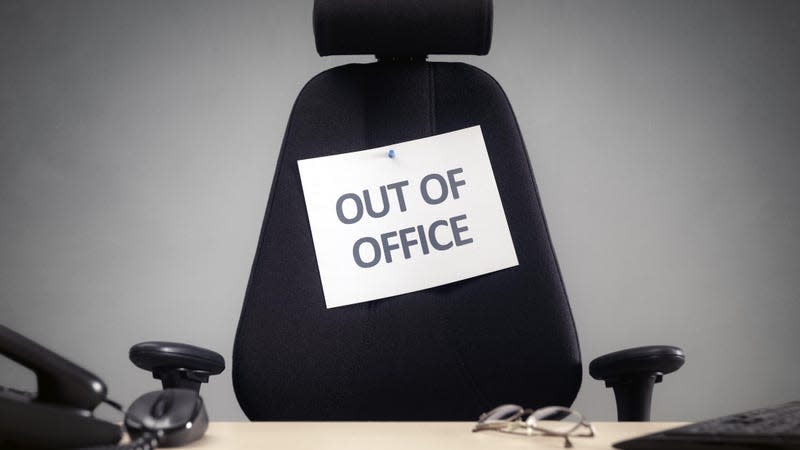Employers Can Dock Paid Time Off If Workers Don't Meet Quotas, U.S. Court Rules

As the saying goes, “time is money.” Or...is it?
You like your vacation days? You like your little paid scraps of freedom, personal leave, and sick time that allow you to indulge in frivolous human needs like going to the doctor, seeing faraway family, or resting when ill? Well then, you better not fall behind at work, because all of it could legally disappear in an instant, according to a new U.S. court ruling.
Employers are allowed to dock salaried employees’ paid time off, three 3rd Circuit Court of Appeals judges unanimously decided on Wednesday, in a first of its kind case. The ruling comes in response to a class action lawsuit filed by workers from Bayada Home Care, Inc., a national at-home health and personal care service for seniors and people with disabilities.
Read more
These Winning Close-Up Photos Show Life That's Often Overlooked
Remembering Enterprise: The Test Shuttle That Never Flew to Space
In that suit, initially filed in 2016, the plaintiff group argued that Bayada’s system of subtracting from their PTO when they fail to meet time-based productivity quotas violated federal wage law.
Per the suit, Bayada uses a system of “productivity points” to set its salaried employee pay scale. Salaried employees include registered nurses, physical therapists, and medical social workers among others. And at each salary grade, these employees are expected to accrue a certain weekly amount of points. Points correlate to tasks, with one point equal to an estimated 1.33 hours of work. If a Bayada employee fails to meet their productivity point quota, the difference between completed and expected work is subtracted from their banked paid time off, the plaintiffs claimed. Yet, again, Bayada says its workers are salaried, not hourly.
By Department of Labor definition, salaried workers are not supposed to have their compensation reduced because of “variations in the quality or quantity of the employee’s work.” Instead salaried, or exempt, employees are meant to be paid a flat rate, not determined by hours worked. The trade-off is, salaried workers don’t get overtime pay.
Through this official classification, the lawsuit plaintiffs attempted to argue that Bayada was illegally punishing them. In a summary within the Wednesday ruling, the judges summarized the plaintiffs claim as follows:
In their appeal, the plaintiffs assert that Bayada’s productivity points system is a mere proxy for compensating the total hours worked by its employees because “point values directly correlate to the amount of time Bayada expects job tasks to take[.]” (Opening Br. at 3-7.) According to the plaintiffs, that point system, together with Bayada’s practice of deducting PTO from their accrued amounts of PTO, or “leave banks,” if they failed to meet weekly productivity minimums, demonstrates that Bayada treats its health care employees as wage earners whose total compensation is pegged to the number of hours they work
Yet, the circuit appeals court judges disagreed. Instead, they decided that paid time off doesn’t count as compensation, and re-asserted that old Labor Department stance that no American employee, salaried or otherwise, is entitled to paid leave. In other words, the judges have ruled against the adage, “time is money,” at least for workers. While on the clock, employee time is company money. But PTO somehow doesn’t equal pay.
If you’re not as productive in any given week as your employer wants you to be, well then they can just deduct that “lost time” from your vacation days. Because clearly, having an ‘off’ day on the job (or a certain task taking up more time than anticipated) is the same as having a day off. Never mind that giving workers their free time back has been shown to boost productivity, time and time again.
The Wednesday ruling is the first instance of a U.S. appeals court deciding whether or not PTO counts as part of a worker’s salary, according to Reuters. It could have broad implications for employee benefits if other companies decide to adopt a similar strategy.
Ultimately, in the Bayada case, the judges’ decision seemed to hinge on the small detail that no employee involved in the suit ever maxed out their PTO through point deductions. So, the company never moved on to the presumed next step of docking pay. From the judgement:
The key question when determining the legal classification of an employee...is whether an employer made an actual deduction from an employee’s base pay. There is no evidence here that Bayada reduced the guaranteed base pay of any of the plaintiffs.
This is despite the fact that the company’s workers say they believed their pay would and could be reduced according to hours worked. “[One plaintiff] asserts that she was under the impression that if she failed to meet her productivity minimum and lacked sufficient PTO to cover the productivity point deficit, Bayada would make a deduction from her base salary. Yet she never exhausted her available PTO, and there is no evidence that Bayada ever docked her salary or that of any other plaintiff,” the ruling says.
A secondary claim in the original suit also alleged that Bayada “actively and deliberately fosters confusion about its use of PTO time,” and “intentionally leads Clinicians to believe that if their PTO is exhausted...they will only be paid for the productivity points they have earned that week.” But apparently that doesn’t matter, also long salaries remain intact, the court decided.
A Pennsylvania District Court had already granted a 2021 summary judgement in favor of Bayada in the case. This appeals decision is the second time U.S. judges have sided with the company, which employees about 28,000 employees and operates in 23 states. So—what are you doing reading this article? Shouldn’t you be getting back to work? Your vacation time could be on the line.
More from Gizmodo
Sign up for Gizmodo's Newsletter. For the latest news, Facebook, Twitter and Instagram.

